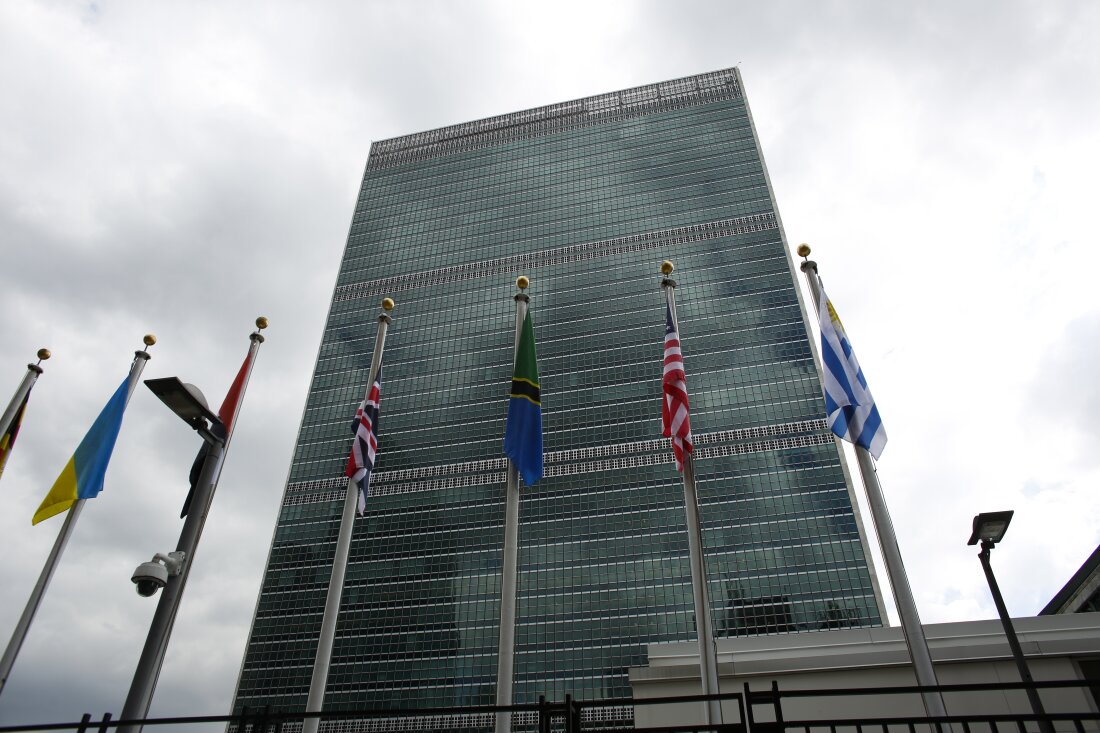
The United Nations headquarters in New York Metropolis on on September 21, 2021.
Timothy A. Clary/Getty Pictures North America
conceal caption
toggle caption
Timothy A. Clary/Getty Pictures North America
The United Nations Basic Meeting adopted a worldwide pact on Sunday that included express calls to section out fossil fuels — which has been a cussed sticking level in local weather change talks for many years.
The decision to maneuver away from fossil fuels is printed within the “Pact of the Future” — a broad plan for the U.N.’s 193 member nations to work collectively throughout a spread of challenges, from escalating conflicts to rising poverty to local weather change. Warning that inaction on varied points threatens to push individuals around the globe “into a future of persistent crisis and breakdown,” the doc additionally laid out a framework for digital cooperation and synthetic intelligence governance.
In a press launch, the U.N. mentioned the settlement was years within the making. The purpose was to deal with the issues of in the present day, in addition to anticipate the troubles of tomorrow. It was reached on the opening of the two-day “Summit of the Future” in advance of the 79th session of the U.N. General Assembly, which kicks off on Tuesday.
The provision echoes a commitment agreed by nations last year at the U.N. climate conference in Dubai. At the time, not everyone was happy with the final agreement. Critics of the deal said it lacked a clear path toward phasing out fossil fuels and pointed out a “litany of loopholes” in the final text.
While Sunday’s pact outlines 56 broad actions to address the world’s biggest challenges, the U.N. said “follow-up motion” is needed to ensure that the commitments are followed through.
The U.N.’s call to action on fossil fuels
In the Pact of the Future, signatories agreed, “We’re deeply involved on the present sluggish tempo of progress in addressing local weather change,” and they explicitly raised concerns with the continued growth of greenhouse gas emissions.
The pact called for reaffirmed commitment to the Paris climate agreement, which laid out goals to move away from fossil fuels and toward renewable energy.
Extra particularly, it known as for international locations to “tripl[e] its renewable energy capacity globally and doubling the global average annual rate of energy efficiency improvements by 2030,” in addition to “accelerat[e] efforts towards the phase-down of unabated coal power.”
It additionally inspired the unfold of electrical or different zero- to low-emission automobiles and urged international locations to section out fossil gas subsidies “as soon as possible.”
Local weather activists applaud pact however say phrases are usually not sufficient
Alex Rafalowicz, government director of the Fossil Gas Non-Proliferation Treaty Initiative, applauded the pact for addressing fossil fuels, however added that nationwide commitments are usually not sufficient and international locations have to agree on a transparent world plan on find out how to sort out fossil gas manufacturing head-on.
“Neglecting to take decisive motion on the foundation reason for the local weather disaster is a misplaced alternative to sort out one of many best threats of our time,” Rafalowicz said in a statement. “The time for half-measures and false options has handed.”
Romain Ioualalen, the worldwide coverage marketing campaign supervisor for Oil Change worldwide, mentioned the pact’s true impression will solely come as soon as international locations devise plans on find out how to section out fossil fuels. Ioualalen added that wealthy nations should paved the way.
“Only through concrete and binding financial commitments and rapid action to phase out fossil fuels can we secure a livable future within 1.5°C,” Ioualalen mentioned, referring to the worldwide warming benchmark set by the Paris Settlement.
For Worldwide Local weather Politics Hub director Catherine Abreu, fossil gas phaseout is the “new standard for climate action” to which all international locations ought to maintain themselves accountable.
“From now on, any country claiming climate leadership will be put to this test: do you have a fossil fuel transition plan? And for rich producing countries, the test includes support for developing countries to make their transition,” Abreu mentioned in a press release.






